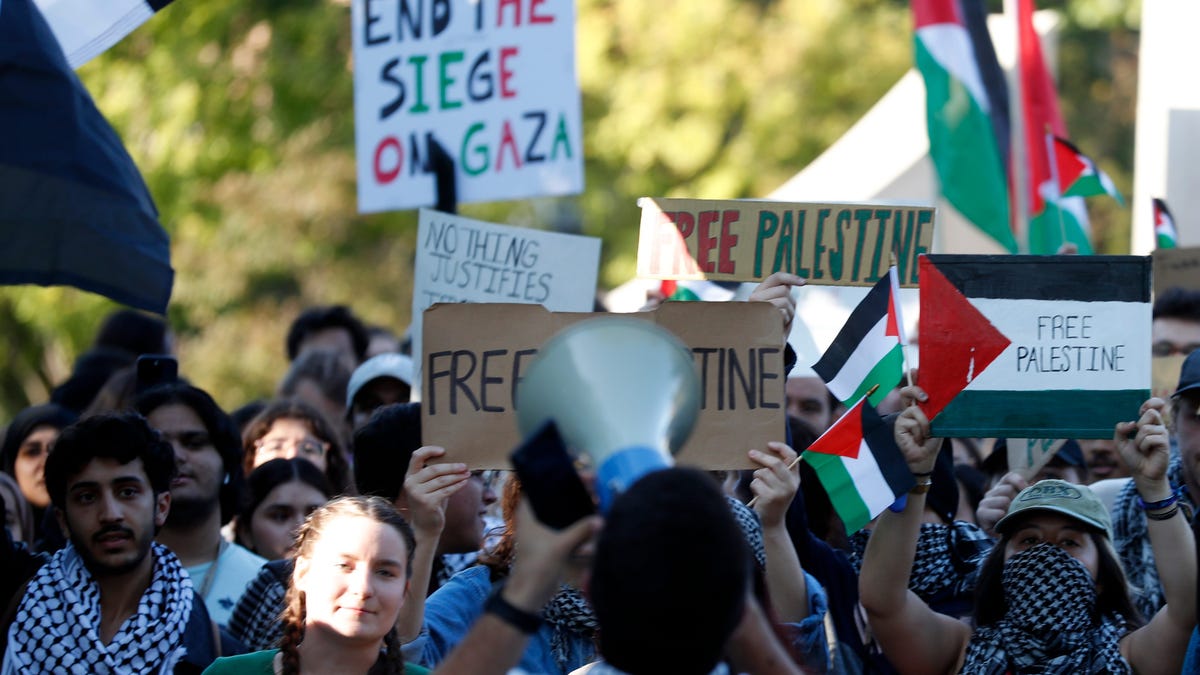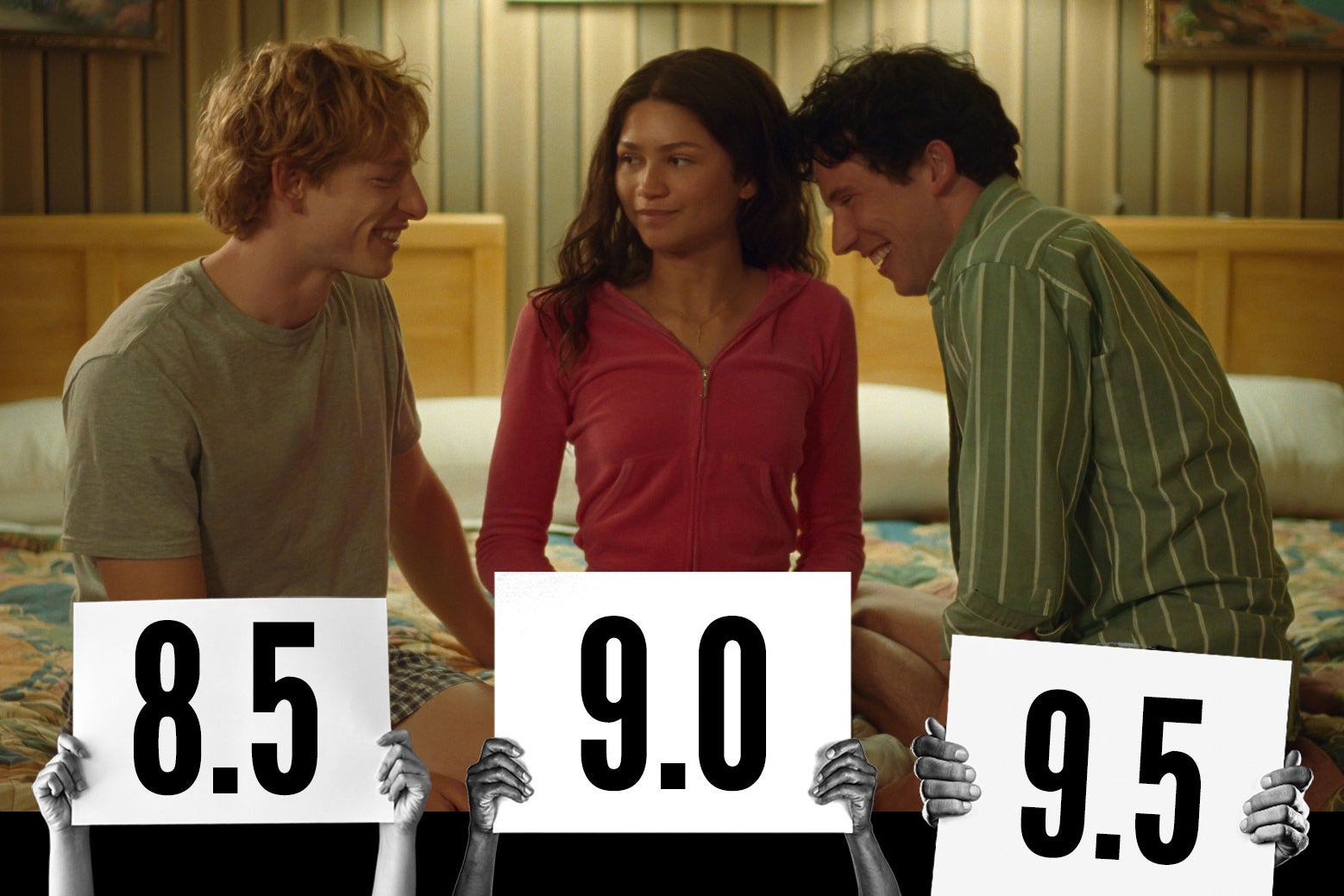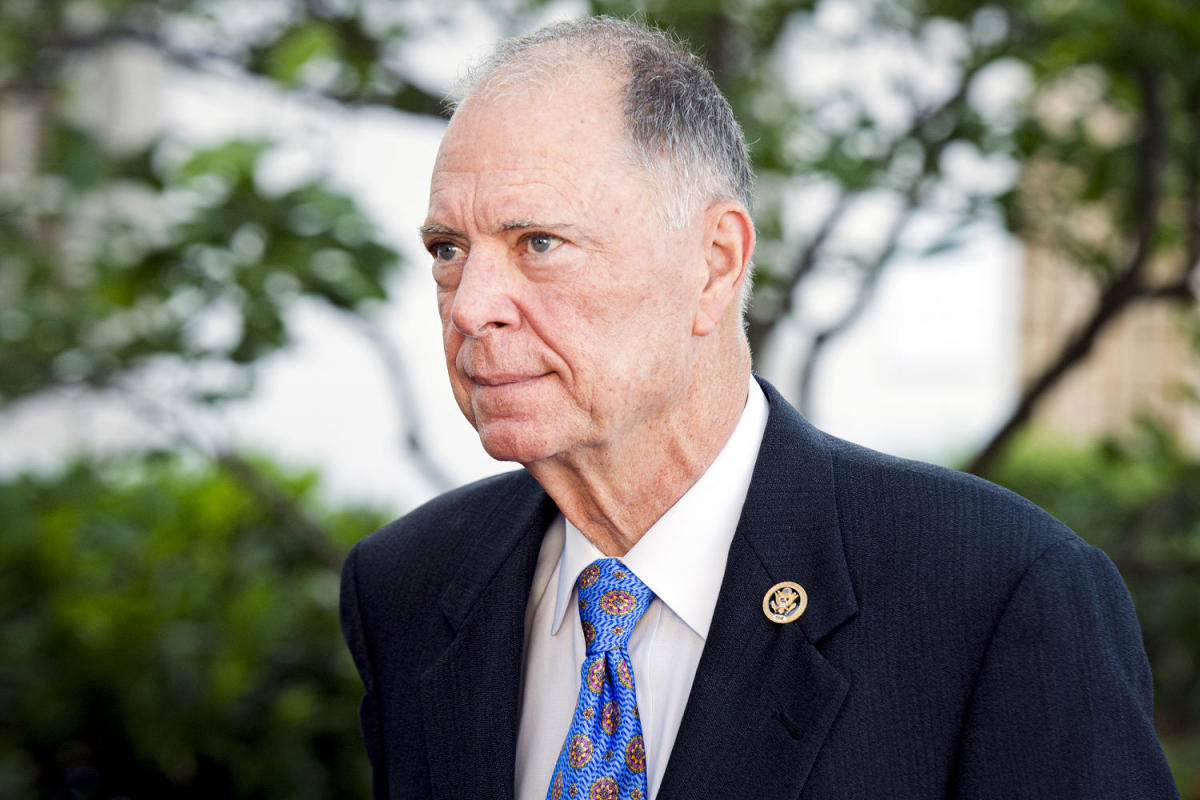Many Jewish and Muslim families are drawing up a new set of criteria for the colleges they hope their kids will attend next year.
What to know about tension on campuses over Israel-Hamas conflict
Colleges have reported an increase in hate crimes against Muslim and Jewish students as tensions rise on campuses over Israel-Hamas war.
George Washington University used to be one of Josh Jury’s top choices for college. Its vibrant chapter of Hillel, a popular club for Jewish students, piqued the interest of the Illinois high school senior, who wants to study international relations.
That all changed a few weeks ago, when backlash mounted at the private college over student protests of the Israel-Hamas war. In Jury’s view, the university’s response to the controversial incident was “really disheartening.”
He recently decided to take a gap year between high school and college. As disagreement over the war upends American higher education, he’s not the only student rethinking his college plans.
On top of the typical anxieties the college admissions process invariably brings, many Jewish and Muslim families are now drawing up a new set of criteria for which schools they hope their kids will attend next year. Over the next few months, exactly how college leaders navigate the ongoing strife could have a notable impact on which campuses parents and students ultimately choose. For Jewish students in particular, the mayhem has the potential to accelerate a trend over decades of declining Jewish enrollment at the country’s most selective schools, where much of the controversy related to the war has been centered.
In interviews and emails, more than a dozen Jewish parents and students told USA TODAY they’ve reconsidered their prospective college lists in recent weeks while the Israel-Hamas war exposes deep divisions on college campuses.
“We are totally switching it up,” said Jennifer Schultz, the parent of a Jewish 16-year-old who was previously considering both the University of Pennsylvania and Cornell University, in an email. Both campuses have, from the perspective of some Jewish parents, delivered tepid responses amid antisemitic threats.
Campus chaos: Israel-Hamas war stirs free-speech battles at college campuses across US
Another high school senior in Illinois added several colleges to her list in recent weeks based on how those campuses handled protests and antisemitism, her mom Janet Footlik wrote in an email.
“Safety and morality, which we assumed to be a basic right on every campus, became top items on her checklist,” Footlik said. “Not every school is meeting this need or demonstrating a concrete plan to deliver on it.”
‘Reckoning going on with Jewish families and inside many institutions’
Perceived and explicit Islamophobia and antisemitism have thrown college campuses across the country into turmoil, even prompting a warning last week from the Education Department reminding schools that they have a legal obligation to curb discrimination or risk losing federal funding.
Alumni have spun into a state of agitation toward administrators, calling for presidents to step down and threatening to withhold sizable donations. Students have been arrested. Faculty are divided. Four college admissions experts or guidance counselors who serve Jewish students said the war has either impacted their students’ prospective colleges or become a source of anxiety for parents of graduating seniors.
“There’s a reckoning going on with Jewish families and inside many of these institutions,” said Naomi Steinberg, a private college counselor in Florida who works mostly with Jewish students and parents.
Muslim families are alarmed, too. Two college counselors who work primarily with Muslim students told USA TODAY the war’s ripple effects on campuses have become a big concern for the parents they work with.
Abrar Omeish, an at-large school board member in Fairfax County, Virginia, said a Muslim high school senior told her he considered combing through his application and taking out references to his ethnic identity and pro-Palestinian activism.
“Kids were genuinely expressing fear that this could impact their college admissions,” Omeish said after speaking with high schoolers in her district who participated in campus protests.
Farheen Khan, a guidance counselor at Pillars Preparatory Academy, an Islamic school in New Jersey, said in an email that Islamophobic insults have been shouted at her and her students on college visits. She said that in a time of rising hate incidents, Muslim students might be safer at larger, more urban campuses instead of smaller ones.
“Islamophobia has increased drastically, and unfortunately students and parents have had to take safety into consideration as they make decisions for four-year commitments for higher education,” she said.
‘Tectonic shift’ in college approach
Claudia Granville, the mother of Jewish high school seniors in Massachusetts, said her twins scrapped applications to two colleges because they felt statements about the war issued by individual departments at the schools to be antisemitic. She declined to specify which schools, worried that naming them could negatively affect her kids’ early decision applications.
“It’s been a tectonic shift,” she said, referring to their approach to college admissions.
Granville’s family isn’t the only one trimming its list of colleges. Lauren Cook, the dean of college and gap-year advising at Jewish Community High School of the Bay in San Francisco, said some of her students have also reconsidered their college applications. One junior downsized her list of prospective colleges from 10 to just three, she said.
“She doesn’t feel like there’s anywhere that’s safe to go,” Cook said.
It was one of the more dramatic reactions Cook said she’s fielded in recent weeks – most of her seniors have stuck with their original plans. Yet concerns from parents and students related to the war have come up frequently, she said.
Gary Berger, who is part of the National Association for College Admission Counseling’s special interest group for Jewish schools and students, said he’s getting “barrages” of questions from parents across the country. He said he has yet to see a student pull an application because of the war, though.
The outcry has prompted him and other counselors – of both Jewish and Muslim students – to scramble to come up with college admissions guidance they’ve never had to give before.
“What you should be paying attention to is administrative response: Is there one?” said Cook.
Muslim, Jewish families already face changed college admissions landscape
For many American families, the college admissions process has always been a black box.
Guidance on how to navigate it isn’t available to everyone, and that disparity drives some parents to shell out money for pricey private consultants – if they can afford it. College rankings don’t accommodate everyone’s wants, and the price tag, and sticker shock that comes with it, always looms over any decision. Even in the best of times, choosing the right school is a stressful undertaking.
What college should I go to? This guide to campus culture can help you decide
The process is even more labor-intensive for families from certain religious or ethnic groups.
Muslim students, for instance, typically seek out colleges with vibrant Muslim Student Associations, single-sex dorms and easily accessible prayer spaces, said Hamzah Henshaw, who has worked as the college and guidance counselor for high schoolers at the Al-Noor Academy, an Islamic school in Massachusetts.
Jewish students have their own distinct factors to consider: access to kosher dining halls, for instance, and accommodations for Jewish traditions and holidays.
Those considerations can narrow a student’s pool of prospective schools in a big way. A study published in the academic journal Sociology of Education last year found that only about a quarter of American college campuses have Jewish or Muslim student groups.
Though Henshaw said none of his students have pulled colleges from their lists: It’s still early in the college application season. The Nov. 1 deadline for early decision applications only just passed, and deadlines for regular decision applicants aren’t until early next year.
Many factors ultimately influence which colleges students choose. Still, he said, families will undoubtedly keep watch on the campuses where hate rears its head.
“There’s not an obvious safe haven.”
Zachary Schermele is a breaking news and education reporter for USA TODAY. You can reach him by email at [email protected]. Follow him on X at @ZachSchermele.

Amanda Smith is a dedicated U.S. correspondent with a passion for uncovering the stories that shape the nation. With a background in political science, she provides in-depth analysis and insightful commentary on domestic affairs, ensuring readers are well-informed about the latest developments across the United States.







:max_bytes(150000):strip_icc()/The-Best-7-Day-Walking-Plan-for-Insulin-Resistance-8cf4c8a8c16e4dddac34d5d97633e91f.jpg)